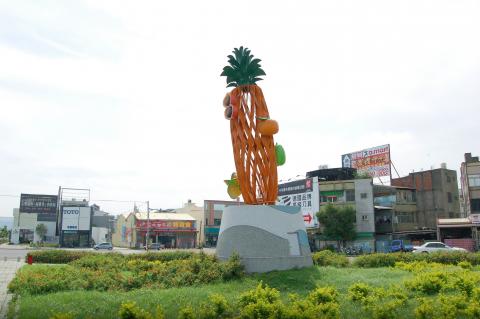Residents of Changhua County’s Yuanlin Township (員林) are not happy with a statue portraying various fruit that was erected at the intersection of Jhongshan and Jyukuang roads in the city, saying that it did not resemble the fruit it was supposed to.
The 7m tall statue — meant to represent a pineapple, a starfruit, a honey orange, a guava and a Chinese chestnut — is made of stainless steel and steel plates, and marks the entrance to a rezoned area that spans more than 184 hectares.
However, since its installation in March, residents in the township have complained that the “pineapple” was too thin and long, looking more like a carrot, and that it was too slanted and looked like it might topple over.

Photo: Tang Shih-ming, Taipei Times
There has also been criticism of how the two Chinese chestnuts attached to the pineapple made it look like the pineapple had eyes.
The guava part of the statue also came under criticism, with residents debating whether it looked more like a guava or a sweet jujube.
Township representative Chen Chiu-jung (陳秋蓉) said that aside from the starfruit and the honey orange appearing relatively normal, the other fruits in the statue were “ugly.”
Chen said she did not understand why the statue included a pineapple, because the township does not produce pineapples and added that it demonstrated ignorance of the township’s agricultural produce.
Changhua County Councilor Chen Su-yueh (陳素月) also criticized the statue, calling it “crude and ill-made” and a disgrace to all Yuanlin residents, adding a call for the county government to remove the statue and remake it.
Meanwhile, Yuanlin Township Secretary-General Lai Chih-fu (賴致富) said that while the inclusion of the pineapple might seem inappropriate, it was possible that the designer of the statue wanted to use the fruit to symbolize that good luck will come.
The word for pineapples in Hoklo (commonly known as Taiwanese) is ong lai, and is usually rendered into Mandarin with the characters wang lai (旺來) instead of fong li (鳳梨) because the word ong in Hoklo can also mean “prosperity.”
Lai also said that the township had told the county government earlier that several residents found parts of the statue to be “unlike the original fruit they were supposed to resemble.”
Changhua County Government Department of Land Director Wang Yin-ho (王銀和) said that the statue was a gift from the companies participating in the rezoning and cost about NT$5 million (US$173,000) to make.
The government had told the companies how the residents felt about the statue, and asked them to take those feelings into consideration and remove the statue, Wang said.
However, the artist who designed the statue insisted it was a work of art, Wang added.
Wang said the government respected the artist’s opinion, but took residents’ complaints seriously, and that the county government would continue to negotiate an acceptable resolution with the companies that commissioned the statue.

Alain Robert, known as the "French Spider-Man," praised Alex Honnold as exceptionally well-prepared after the US climber completed a free solo ascent of Taipei 101 yesterday. Robert said Honnold's ascent of the 508m-tall skyscraper in just more than one-and-a-half hours without using safety ropes or equipment was a remarkable achievement. "This is my life," he said in an interview conducted in French, adding that he liked the feeling of being "on the edge of danger." The 63-year-old Frenchman climbed Taipei 101 using ropes in December 2004, taking about four hours to reach the top. On a one-to-10 scale of difficulty, Robert said Taipei 101

Nipah virus infection is to be officially listed as a category 5 notifiable infectious disease in Taiwan in March, while clinical treatment guidelines are being formulated, the Centers for Disease Control (CDC) said yesterday. With Nipah infections being reported in other countries and considering its relatively high fatality rate, the centers on Jan. 16 announced that it would be listed as a notifiable infectious disease to bolster the nation’s systematic early warning system and increase public awareness, the CDC said. Bangladesh reported four fatal cases last year in separate districts, with three linked to raw date palm sap consumption, CDC Epidemic Intelligence

Two Taiwanese prosecutors were questioned by Chinese security personnel at their hotel during a trip to China’s Henan Province this month, the Mainland Affairs Council (MAC) said yesterday. The officers had personal information on the prosecutors, including “when they were assigned to their posts, their work locations and job titles,” MAC Deputy Minister and spokesman Liang Wen-chieh (梁文傑) said. On top of asking about their agencies and positions, the officers also questioned the prosecutors about the Cross-Strait Joint Crime-Fighting and Judicial Mutual Assistance Agreement, a pact that serves as the framework for Taiwan-China cooperation on combating crime and providing judicial assistance, Liang

US climber Alex Honnold left Taiwan this morning a day after completing a free-solo ascent of Taipei 101, a feat that drew cheers from onlookers and gained widespread international attention. Honnold yesterday scaled the 101-story skyscraper without a rope or safety harness. The climb — the highest urban free-solo ascent ever attempted — took just more than 90 minutes and was streamed live on Netflix. It was covered by major international news outlets including CNN, the New York Times, the Guardian and the Wall Street Journal. As Honnold prepared to leave Taiwan today, he attracted a crowd when he and his wife, Sanni,